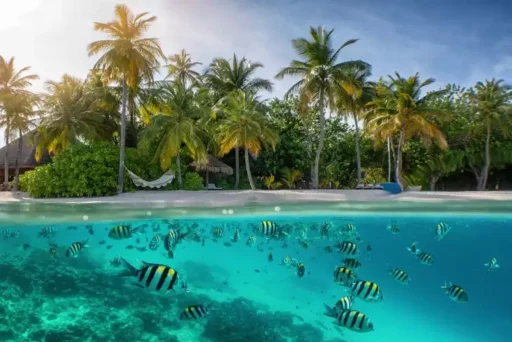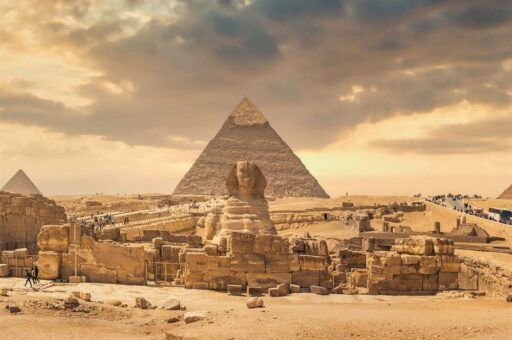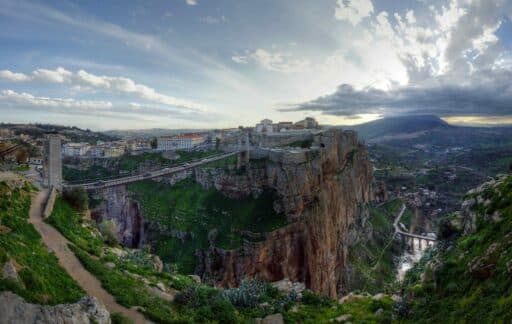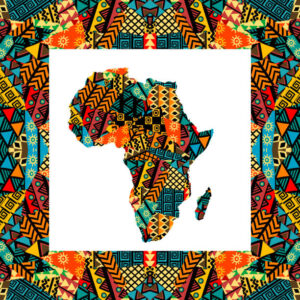Let’s have a look at the 10 richest countries in Africa by GDP per capita in 2023.
Africa is the second largest and second most densely inhabited continent in the world, behind only Asia in both of these categories.
Even the most prosperous country on the in question continent has a GDP per capita that is as low as 13,000 dollars, indicating that the continent as a whole has a relatively low level of economic prosperity.
The majority of countries have a per-capita gross domestic product that is somewhere in the range of 2,000 to 4,000 dollars.
The continent has a large amount of resources, but it needs to make some significant advances in technology in order to stimulate growth and maybe become one of the most successful continents in the world.
In spite of its reputation as the continent with the lowest standard of living throughout the world, Africa is without a doubt the most resource-dense area on the planet due to the number of precious resources that can be found there.
Even though none of the countries on the African continent are among the top 30 largest economies in the world, it is of the utmost importance to investigate the region’s wealthiest nations.
South African states, in addition to those in the Maghreb region, enjoy much greater levels of economic development in comparison to those in Central and West Africa.
Because of the major differences between the regions, there are times when sub-Saharan Africa and the Maghreb are analyzed separately from one another.
If you want to invest as an expat or high-net-worth individual, you can email me (advice@adamfayed.com) or use these contact options.
Table of Contents
Economic Growth in Africa
Africa is home to the population with the youngest average age and the fastest growth rate in the world.
It also has the most rapidly expanding metropolitan centers and is making significant strides forward in a number of different industries, including sustainable energy solutions and financial technology.
The continent has a diverse set of opportunities for enormous and all-encompassing growth because of the estimated addition of nearly 2.5 billion people to its population by the year 2050.
This will make the continent the world’s most populous. These opportunities seek to boost wealth not just inside Africa but also on a global scale by capitalizing on the continent’s tremendous people potential and massive natural resources.
The existence of these skills and assets provides the continent with the possibility to dramatically raise its level of productivity and reverse the economic decline that has been seen between the years 2010 and 2019.
During the aforementioned time period, there was a dramatic slowdown in GDP growth of 35 percent. After that, there was an outbreak of the COVID-19 pandemic, which was then followed by an invasion of Ukraine by Russia.
The aforementioned occurrences served as the impetus for reforms that are now being worked out within the framework of the global economy.
Up to sixty percent of Africa’s population is now living in poverty, which may be linked to the comparatively low average annual per capita income growth rate of one point one percent over the course of the past few decades. now, there is a considerable part of Africa’s population that is experiencing poverty.
The beginning of the 21st century was marked by a significant acceleration in economic growth throughout Africa.
This trend, which suggested positive outcomes and persisted for a decade, was followed by a return to the slow pace that had been seen during the 1990s.
There was a significant rise in the yearly average growth rate of the real GDP between the years 2000 and 2010, which increased to 5.1 percent. This gain occurred between the years 2000 and 2010.
When compared to the previous decade, during which the yearly average growth rate stood at a meager 2.5 percent, this growth rate shows a tremendous improvement over that period of time.
The yearly rate of growth slowed to 3.3 percent during the whole time range extending from 2010 to 2019, bringing the total to 3.3 percent.
It is remarkable that the overall number of people living in poverty throughout Africa experienced an increase of 30 million, despite the fact that the GDP of the continent had a faster growth rate compared to its population expansion during the same time period.
The gap in the average annual growth rates of GDP per capita between India and China, which stand at 5 percent and 8 percent respectively, and Africa’s merely 1 percent during the period spanning from 1990 to 2019, could be largely ascribed to disparities in population growth.
India and China now have growth rates that stand at 5 percent and 8 percent respectively.
In Africa, over half of the population lives in countries whose gross domestic product (GDP) has grown at a pace that is higher than the average growth rate of 4.2% for the continent from the year 2000, throughout the period of time extending from 2010 to 2019.
According to the findings of this research, the nations in question may be divided into two distinct groups: “consistent growers” and “recent accelerators.”
The majority of these countries have economies of moderate size and have had above-average growth in terms of investment, exports, and urbanization.
These variables have led to an overall increase in productivity within these nations, which has been a result of the overall improvement. These countries serve as important models for the rest of the continent to imitate.
The other half of Africa’s population lives in countries that have had somewhat slower economic development over the course of the preceding decade.
These countries account for the other half of Africa’s population. This encompasses the countries with the most populous economies on the African continent, including Egypt, Nigeria, and South Africa, in addition to 10 of the continent’s least populous nations.
The aforementioned countries, which we classified as belonging to the clusters of “recent slowdown” and “slow growers,” accounted for around 75 percent of the continent’s total GDP in the year 2019.
Increasing productivity is very necessary in order to bring Africa’s economy back to its former vitality.
Richest Countries In Africa By GDP Per Capita
Seychelles: $39,660
The Republic of Seychelles, which can be found in Africa, has the highest GDP per capita of o the list of the richest countries in Africa by GDP per capita, which comes in at $39,660.
This tiny island nation has a population of less than 100,000 people, and tourism is the primary contributor to the country’s economy, making up more than 70 percent of the country’s GDP.

One of the causes that are regarded to have contributed to Seychelles’ high-income level is the country’s thriving fishing industry.
Seychelles boasts a sturdy infrastructure and a great quality of life despite its comparatively small area and population of around 97,000 people.
The country has made significant investments in the fields of education and healthcare, as seen by the provision of free primary and secondary education as well as the construction of a healthcare system that is publicly supported and provides a broad availability of medical services.
These initiatives demonstrate the nation’s commitment to fostering a well-educated and healthy population.
Furthermore, Seychelles has a politically stable atmosphere, which is a feature that has drawn foreign investment and contributed to the rise of the economy.
Mauritius: $29,160
The fact that Mauritius has a GDP per capita of $29,160 places it in second place among the 10 richest countries in Africa by GDP per capita for the year 2023.
This can be seen by looking at the rankings. Mauritius has become one of the wealthiest countries on the African continent as a result of its sustained era of vigorous development over a number of decades.
According to the Doing Business Report published by the World Bank in 2020, the country is ranked in first place in Africa and thirteenth place worldwide.
In addition, it is significant to highlight that this specific market is one of the top five high-income markets that are seeing fast expansion on a worldwide scale.
Libya: $24,600
According to its GDP per inhabitant, Libya is regarded to be among the wealthiest countries in all of Africa.
More than 95% of export earnings and around 60% of the country’s GDP are attributed to the petroleum sector, which is the primary driver of the Libyan economy and the primary contributor to the profits made by the petroleum industry.
The very low number of people living in this nation is the primary contributor to its high per capita income of $24,600.
Botswana: $19,400
It is possible that the remarkable economic success of Botswana in comparison to its surrounding nations may be principally attributable to the country’s diamond mining industry, the execution of prudent fiscal measures, and the adoption of a cautious approach to the nation’s foreign policy.
Botswana is often regarded as the country on the African continent that has the least amount of corruption overall.
The current GDP per capita of the country stands at 19,286.91, showing that its economic performance places it among the countries of the world that are increasing at the quickest rate.
Gabon: $19,200
Gabon is recognized as one of the richest countries in Africa by GDP per capita, owing to the fact that its GDP per capita is $19,200.
The bulk of nations located in sub-Saharan Africa have per capita incomes that are around four times lower than the one experienced by this country.
Despite this, a sizeable segment of the population is still living in poverty as a direct consequence of the large economic gap that exists between them and the rest of the country.
Around 80% of the country’s total exports, 45% of its GDP, and 60% of the country’s state budget revenue are derived from the country’s oil output.
Equatorial Guinea: $18,510
Equatorial Guinea is often regarded as an affluent nation within the Central African area. This is mostly because of the considerable oil and gas production operations that take place in the country.
The country is working hard to improve the standard of living of its population by putting into action a strategy for socio-economic transformation that is being driven by the country’s significant oil resources.
The growth that has been experienced in the oil and gas business has been a tremendous benefit to the nation as a whole as a result.
Egypt: $16,980
Egypt, which is located in the northeastern part of Africa and is distinguished by its divide along the rich Nile River Valley, has a prominent position as the most important economic powerhouse on the African continent, as measured by its GDP PPP.
This is a position that Egypt has achieved through its strategic positioning. In addition to this, it is regarded as one of the richest countries in Africa by GDP per capita.
During Gamal Abdel Nasser’s presidency, there was a substantial increase in the degree to which economic power was centralized in Egypt.

However, successive governments headed by Anwar Sadat and Hosni Mubarak pursued liberalization measures, spurred by the necessity to conduct tough reforms. These administrations are credited with bringing Egypt closer to its current state.
Egypt’s goal in implementing its reform and economic openness program from 2006 to 2008 was to increase the country’s level of foreign investment and further its economic growth.
As a direct consequence of this endeavor, large annual growth rates of 7% were achieved, which contributed to Egypt’s rise to the position of one of the richest countries in Africa by GDP per capita.
It is possible that the length of time that this seismic boom lasted would have been much longer if it weren’t for the global financial crisis that took place in the late 2000s.
This crisis brought a slowdown in growth, which settled at 4.7%, and had a negative impact on industries that are dependent on exports, notably manufacturing and tourism.
Because of the arid nature of the climate in this nation, a significant amount of the country’s population as well as its economic activity is concentrated in the area immediately around the Nile River.
There has been a deliberate effort made by the people of Egypt to improve the economic situation inside their country.
Egypt’s tourist industry, together with its wholesale and retail commerce sectors, are significant economic assets that contribute significantly to the country’s overall income.
Gas production is an important and robust industry in Egypt, having a considerable influence on the country’s GDP with a positive consequence.
The country’s natural gas reserves are among the world’s largest. The GDP of Egypt was estimated to be 303.092 billion USD as of the year 2019.
The growth rate of the GDP on an annual basis is now at 5.558 percent. It has been determined that the pandemic caused by the Covid-19 virus was a significant component that contributed to earlier downturns in Egypt’s economic situation.
Despite this, the developing economies in Egypt, particularly Egypt’s growing markets, are now making headway toward development across the board.
In contrast to the economies of a number of other African governments, the economy of this country is quite diverse and has the title of being the largest in the North African area.
Manufacturing was responsible for 16% of Egypt’s GDP in the year 2015, whereas wholesale and retail commerce was responsible for 13% of Egypt’s GDP, and so on and so forth.
In spite of Egypt’s remarkable economic progress, which has helped to place it as one of the richest countries in Africa by GDP per capita especially in North Africa, a sizeable section of the country’s population, around forty percent, continues to live below the country’s official poverty line.
The socioeconomic gap in the country has led to dissatisfaction on the political and civic fronts, which has finally led to a revolution.
South Africa: $16,090
South Africa has the status of being the eighth on the list of the richest countries in Africa by GDP per capita despite being the nation on the African continent that is both the most industrialized and technologically sophisticated.
The economy has a structure that may be described as having two speeds: one sector is at a level of development that is on par with that of industrialized nations, while another sector has substantial deficits in the infrastructure that supports fundamental functions.
In spite of the fact that the natural resource extraction industry, particularly in chromium, manganese, gold, and platinum, remains the most important contributor to South Africa’s gross domestic product on an annual basis, the country’s economy has undergone diversification since the end of apartheid, particularly within the services sector.
This is the case despite the fact that natural resource extraction continues to be the most important contributor.
Due to the fact that it is the wealthiest country in Southern Africa, South Africa has a prominent position. It contributes 25 percent to the whole economy of the African continent, and as a result, it has a significant impact on the progression of economic growth across the area.
The South African financial sector provided a sizeable contribution of $41.4 billion to the country’s gross domestic product in the year 2019.
This was an impressive figure. In addition, by the year 2021, the financial institutions of South Africa were in charge of the management of assets totaling more than $1.41 trillion.
South Africa’s economy has many of the hallmarks of a rising market economy, including an abundance of natural resources and a solid infrastructure that includes well-developed communication, energy, and transportation sectors.
In addition to this, the country is home to the well-known African stock market, which is now ranked sixteenth on the world stage.
In spite of the fact that it has a highly developed infrastructure and is often regarded as one of the richest countries in Africa by GDP per capita, South Africa’s economic development is being held back by issues associated with the effective transportation of commodities to key hubs as well as an erratic power supply.
In South Africa, there is a considerable wealth gap, with the top one percent of the population owning a major portion (70.9%) of the country’s total wealth.
This indicates that the wealth distribution in South Africa is very unequal. In comparison, the poorest sixty percent of the population only own seven percent of the country’s wealth.
On the other hand, it is important to point out that the South African rand has a prominent place as the currency that is held in the highest esteem in the Southern African area.
Additionally, the rand is generally acknowledged as being one of the most robust and significant legal tender currencies on the African continent.
One of the most significant factors that contribute to South Africa’s image as one of the richest countries in Africa by GDP per capita is the trend that sees many people from other parts of Africa moving to South Africa in the hope of finding better economic opportunities there than they might find in their home countries.
Algeria: $13,510
Algeria is often regarded as one of the most important oil and gas producers located on the African continent.
It has the position of the third greatest economic power on the continent, as measured by GDP PPP, and is regarded as one of the richest countries in Africa by GDP per capita.
Algeria, like a number of other OPEC members, has a major dependency on its oil exports and the natural variations that occur in the worldwide market.
Since Algeria gained its independence in 1962, the country has been successful in developing a solid industrial infrastructure, mostly as a result of the execution of large economic efforts.
The Algerian economy has been through a number of rough patches, despite the country’s considerable successes in the development of infrastructure, such as roads, highways, educational institutions, healthcare facilities, industrial sectors, housing, and public transportation systems like metros and tramways.

All of which have contributed to Algeria’s position as one of the most prosperous nations in Africa.
Despite these successes, Algeria’s economy has experienced a number of challenging times in recent history.
The Algerian economy had severe challenges during the 1980s, particularly in 1986 when the strategy to combat shortages and achieve stabilization was put into action.
This plan intended to reduce the government’s dependency on oil earnings and stabilize the economy of the country.
Nevertheless, during this time period, the oil counter-shock had a significant influence on the Algerian economy, which had a negative effect on the country’s mostly rentier economic structure.
At the beginning of the 1990s, Algeria began the process of implementing structural changes that would help the country more smoothly transition to an economy based on market principles.
In the year 2001, the administration that was headed by Abdelaziz Bouteflika made a series of recommendations that were intended to introduce liberalization measures in a number of different sectors and to make it easier for foreign investment to be made in the nation.
The continuation of the transition from a planned economy to a market economy is defined by the persistent influence of the government over a variety of different businesses and services.
Algeria is the wealthiest nation in the Maghreb area; nonetheless, the country’s economy continues to be significantly dependent on cash earned from oil and gas, which is Algeria’s primary source of income.
In its attempts to develop an industrial base that is capable of competing on a global basis and to diversify its economy, the nation has run across a number of obstacles.
In spite of this constraint, Algeria is able to maintain a good level of infrastructure and a reasonable standard of living because of the revenues that are generated from its oil and gas resources.
The Algerian government was able to demonstrate its financial capabilities in the year 2013 when it essentially nullified a total of $902 million in liabilities that it held on behalf of 14 other African Union member states.
Tunisia: $13,270
The countries of Algeria and Libya are located to the north and south of Tunisia, respectively, and the country’s boundaries reach all the way to the Mediterranean Sea. The questioned country and Italy share sea borders in several areas.
The term “Arab Spring” refers to a wave of protests against various political regimes that began in 2011 and spread through a number of countries in North Africa and the Middle East. Tunisia is largely acknowledged as the country that served as the catalyst for these protests.
The historical importance of Tunisia as one of the key areas linked with the ancient Phoenician civilization has contributed to the country’s rise to prominence as a tourist destination.
Carthage rose to prominence throughout its reign as the leading city on a continental and even a global scale, establishing itself as a major center for marine trade.
Hannibal, a great military commander, and statesman from Carthage during ancient times, was widely known for his hostile relationship with the Roman Empire, and the place in question served as his palace. Hannibal’s relationship with the Roman Empire was infamous.
Since the 1960s, Tunisia has maintained a flourishing tourism industry, and in recent years it has developed a reputation for being a well-liked and fairly priced beach resort with an oriental atmosphere. Tunisia has been known as a destination with these characteristics.
In spite of the fact that it did not get its independence until the year 1956, Tunisia has been able to effectively lift its economy to a position that is superior to that of other African states.
In comparison to the economies of its surrounding nations in the region, this country has a powerful market-oriented economy and social policies that are rather forward-thinking.
The oil and phosphates industries, together with those producing agri-food products and car components, as well as tourism, are the most important contributors to Tunisia’s economy.
Final Thoughts
It is often acknowledged that Africa is the continent that is best endowed with substantial deposits of non-renewable natural resources, such as gold and diamonds, which contribute to the continent’s tremendous wealth.
Despite this, it is still thought of as one of the economically backward countries on the whole planet by a large majority of people.
Economists determine this occurrence by computing Africa’s Gross Domestic Product (GDP). GDP refers to the entire monetary value of all the products and services that are produced and exchanged inside a country.
This value comprises a wide range of industries, including agriculture, military, and the mining of natural resources.
Does the low GDP of Africa offer an accurate depiction of the continent, considering there are 54 states and over 1.4 billion people living there?
Because of the widespread misconceptions about the country and the people who live there, it is quite evident that the reaction is unfavorable.
It is remarkable that a number of countries on the African continent are now experiencing substantial economic growth and development while having to contend with a range of economic and social challenges.
It is anticipated that Africa’s Gross Domestic Product (GDP) would reach something in the neighborhood of $29 trillion by the year 2050.
This list of the richest countries in Africa by GDP per capita provides a chance to immerse oneself in the fascinating attraction of the African continent, showing its various assets that transcend well beyond simple financial wealth.
Pained by financial indecision? Want to invest with Adam?

Adam is an internationally recognised author on financial matters, with over 760.2 million answer views on Quora.com, a widely sold book on Amazon, and a contributor on Forbes.



